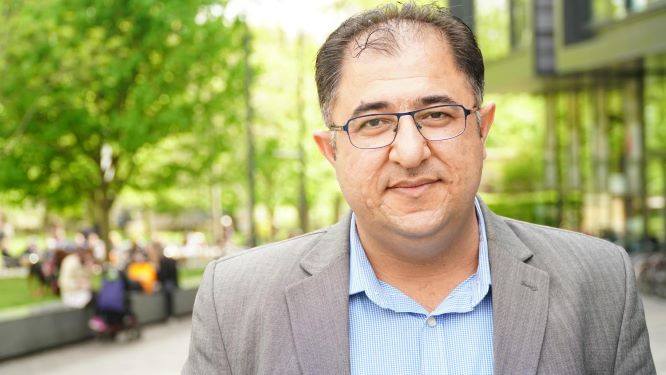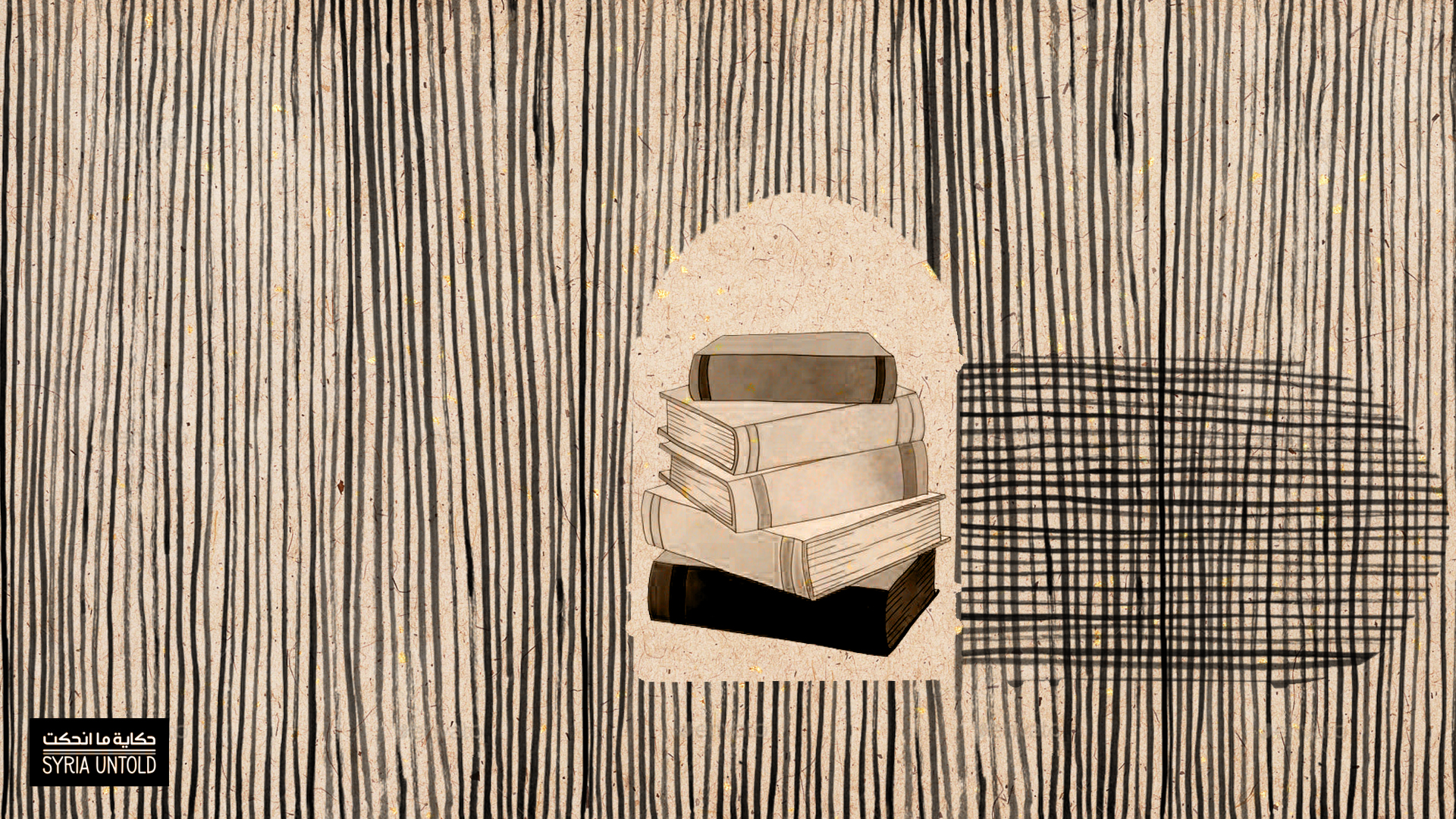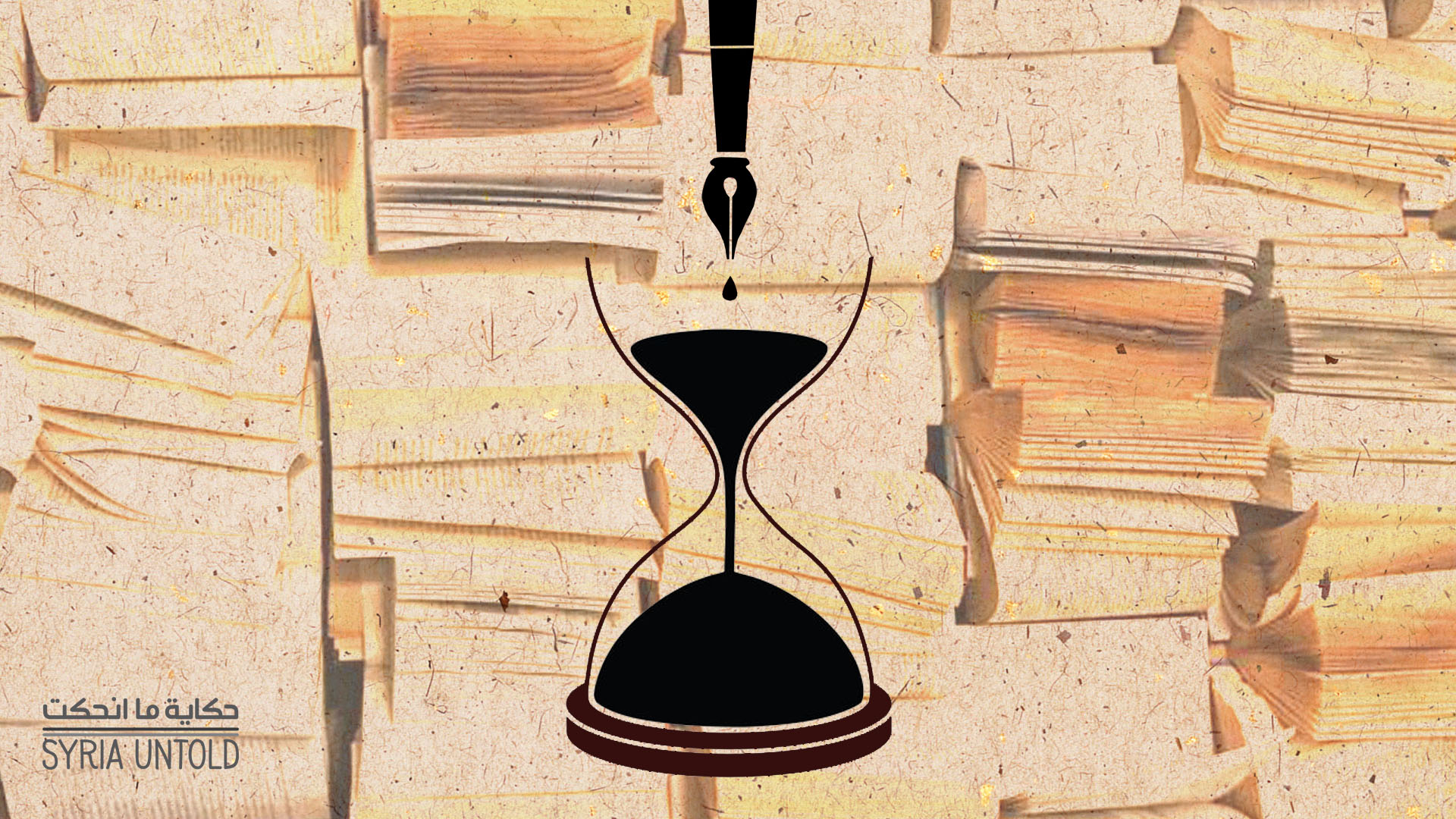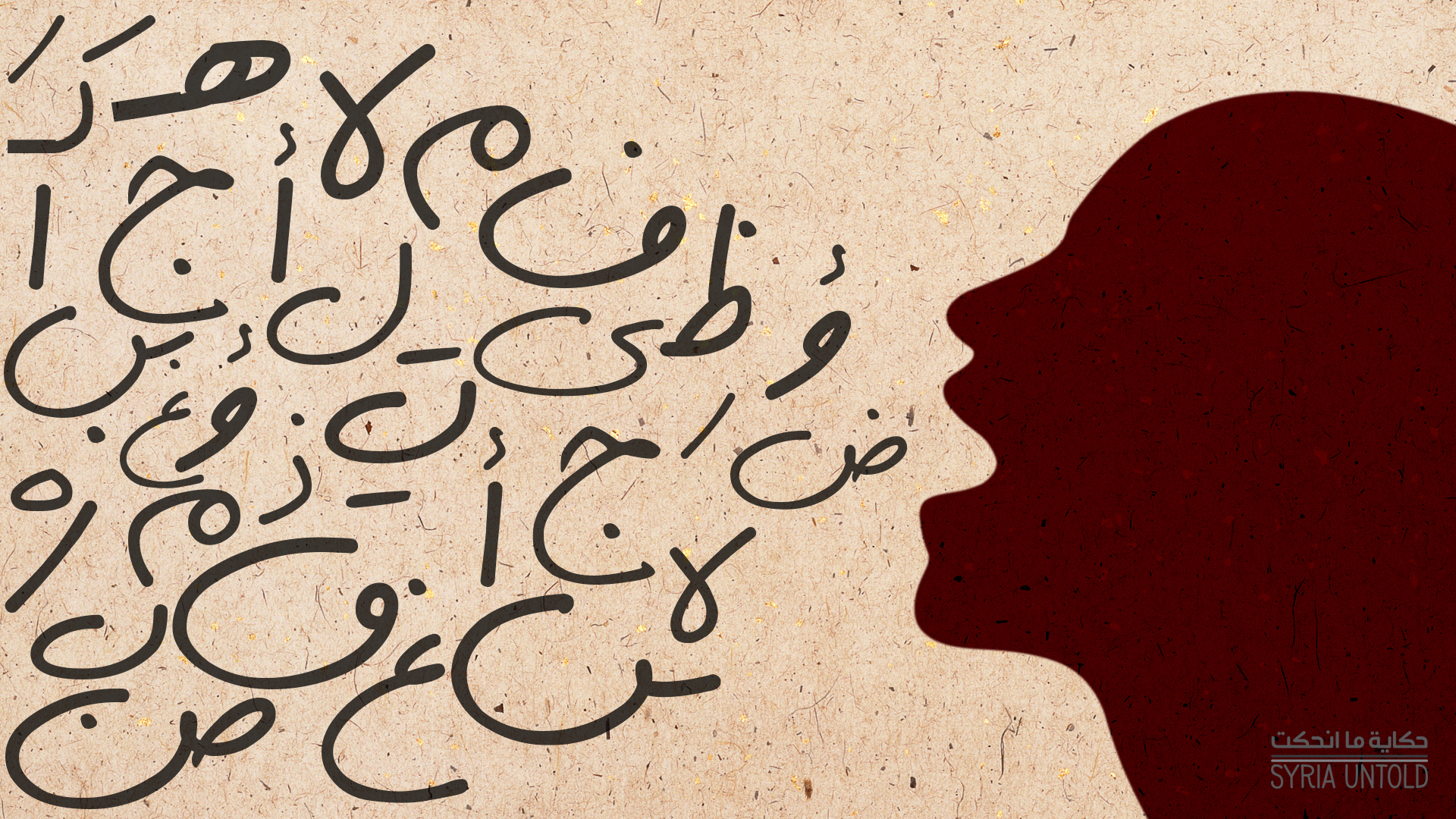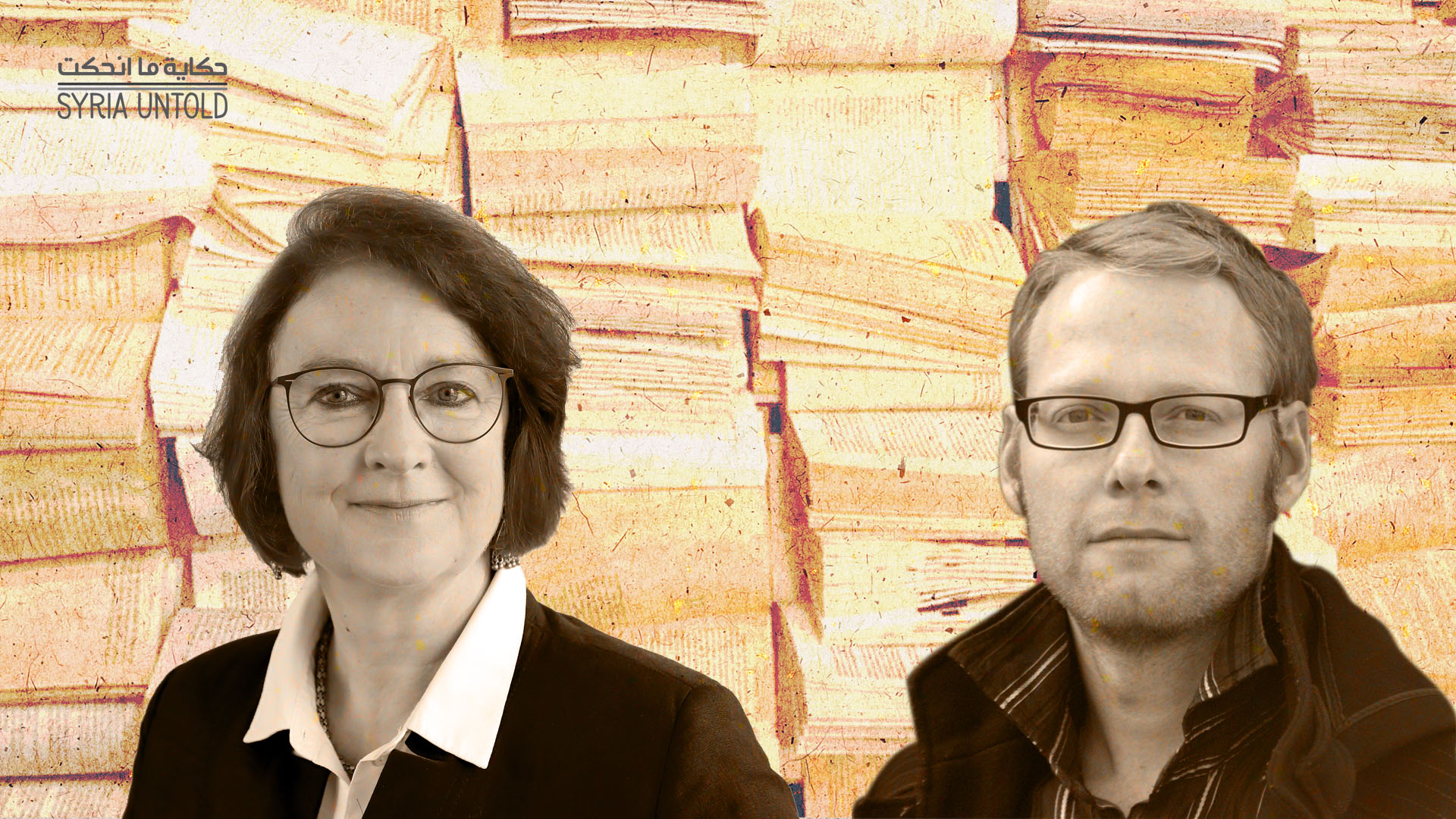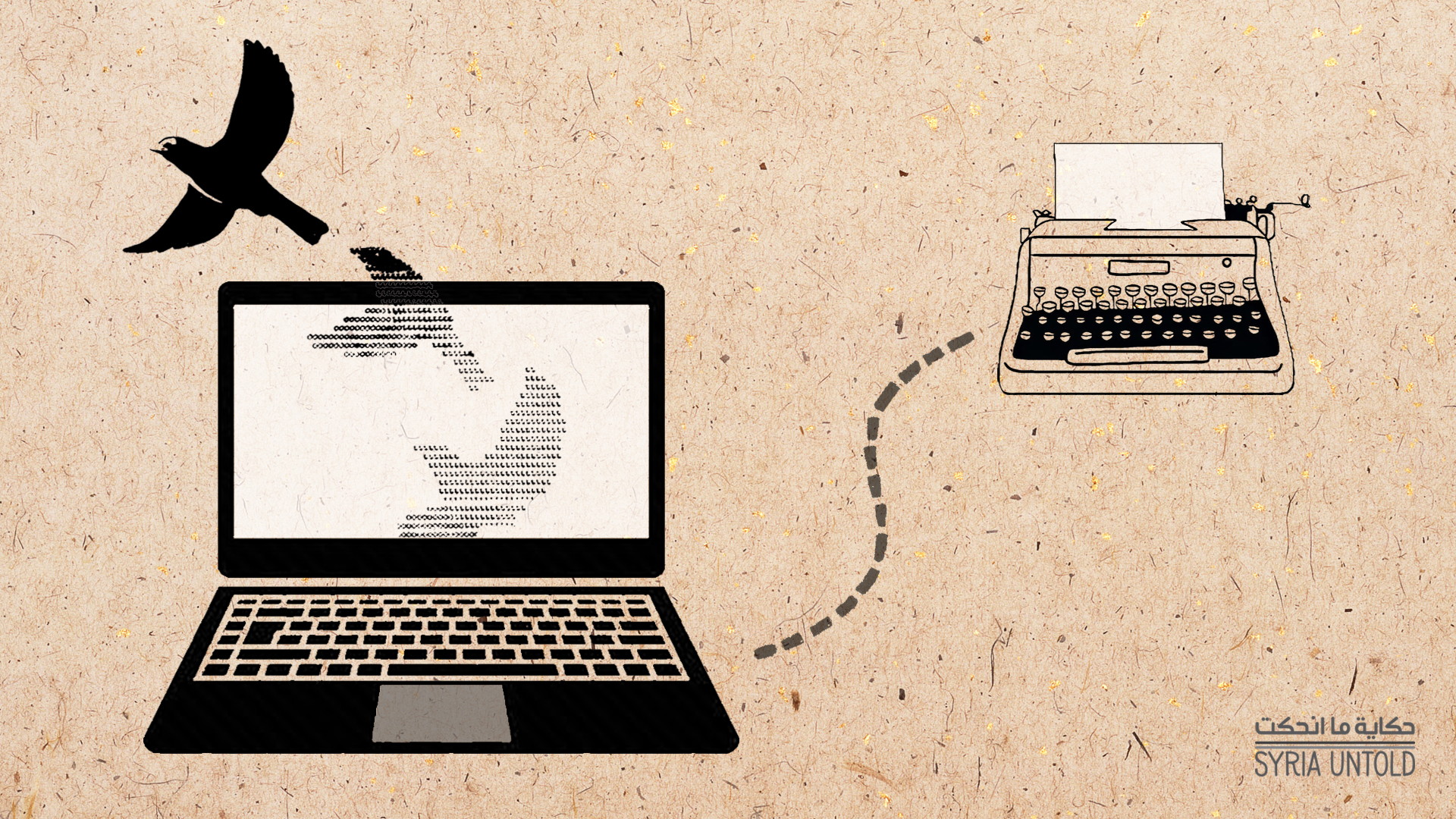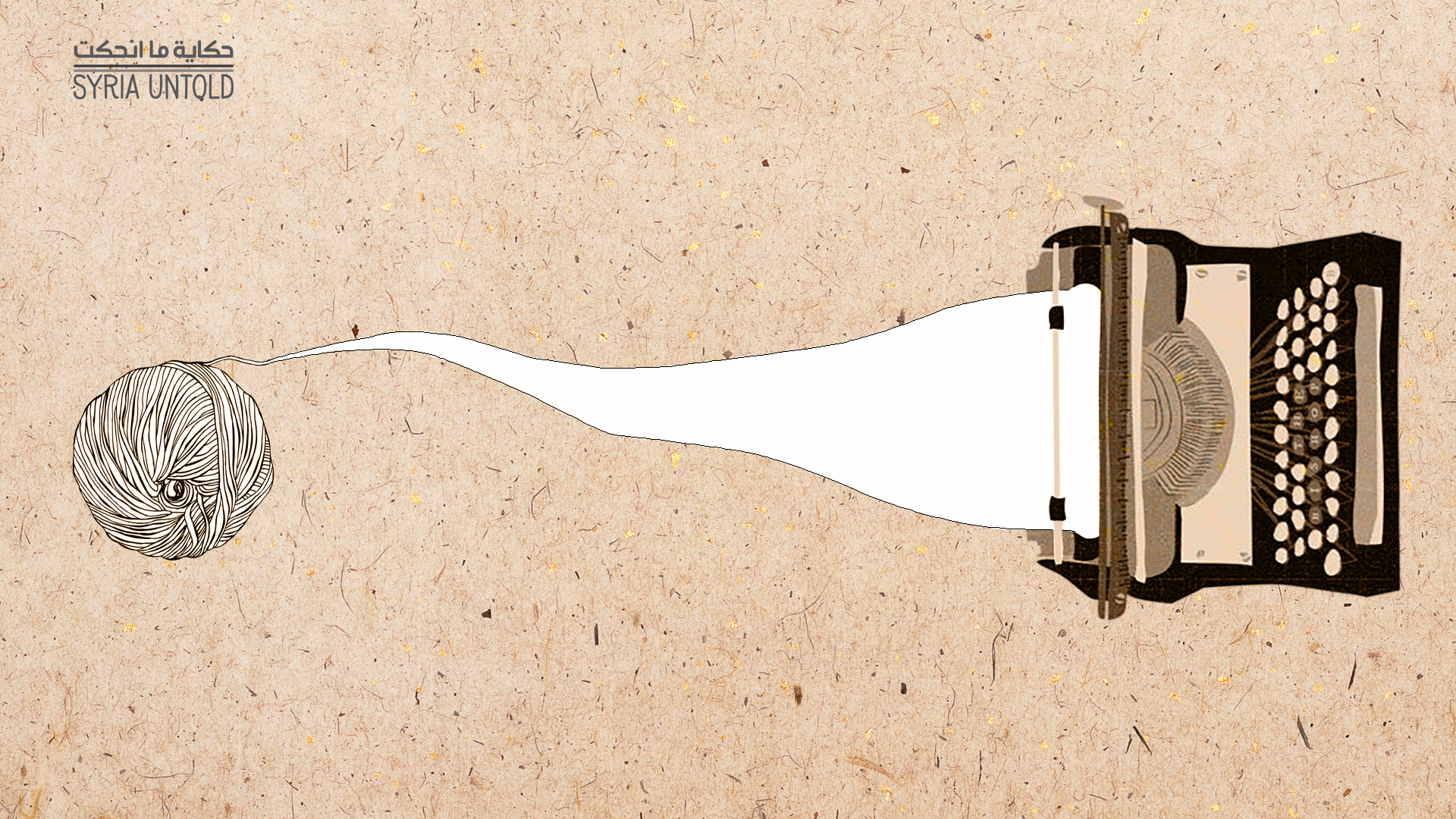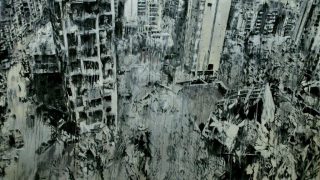Read this essay in Arabic here. This piece is part of a limited series on shifting narratives in Syrian literature, guest edited by novelist Rosa Yassin Hassan.
How would it be safe to describe the Syrian narrative of today? Is it a compilation of milestones that marked the dream of change, the ensuing disappointment and the hope that springs eternal both in life and in stories?
Supposing the year 2000 was a pivotal year in the modern history of Syria: Bashar al-Assad’s rise coincided with the world’s transition into the new millennium. He was keen on portraying himself as an enlightened man seeking openness and change. And supposing that a new era in Syria was to begin with the 21st century, what lay in store certainly paved the way for a later, hoped-for stage of “let bygones be bygones.” This was especially true considering that Assad’s name was associated with modernization and development, and that he tried to portray himself as a godfather who introduced technology into the country using different names and masks.
Politics and the Syrian novel: A mutual influence
16 February 2021
Arts, reality and the test of time
09 February 2021
Two decades later, however, we have come to the realization that Assad was a mere prelude to a new dark tunnel in the modern history of Syria.
Assad failed to deliver on any of his promises. On the contrary, he tightened the government’s security grip in a way that paid no heed to the new millennium. He pursued a policy of terror and intimidation to instill fear and prevent people from taking any steps that would expose the forgery and torture of his regime, whose decay was obvious to Syrians. But his regime fed on both terror and the fabrication of crises to silence any critical or opposing voices, under the pretext that this stage could not bear any criticism of the new era, which itself was nothing but a patch-up of his father’s long years in power.
Corruption was rampant in state institutions. It erased, destroyed and rid state institutions of the spirit of responsibility and commitment to any value. It distorted concepts and changed the ladder of social values. Anyone trying to climb up the ladder, be they opportunistic, corrupt or a thief, became the face of society.
Appreciation of literature, culture and thought receded—almost faded—and turned in the opposite direction. Intellectuals and writers were commonly portrayed as people detached from reality, far from its concerns and drowning in distant worlds that were of no interest to the people.
The regime maliciously ruined readers’ tastes. It distorted their standards and understandings. Literature, culture, ethics and values were neither profitable nor enriching. They were a useless burden people had to rid themselves of in order to climb the ladder of mercenarism, opportunism and corruption. This led to the creation of a group of opportunists working under the guise of literary and intellectual bodies, in a bid to fill the gap created by the regime’s repression and corruption with a faint and fabricated, miserable noise. This noise, however, has failed to rise to the essence of literature and culture, an achievement for the preservation of the values that people have held close throughout the ages.
Writers fighting corruption, injustice, dictatorship and repression faced a challenge: the narration of a story kept in the dark, consigned to oblivion.
These were chapters from the story of a regime that antagonized a country and its people while mastering the strategies of destruction over decades. Writers fighting corruption, injustice, dictatorship and repression faced a challenge: narration of a story kept in the dark, consigned to oblivion, and the commitment to exposing a devastation intended to characterize Syrian society. Meanwhile, those who feigned cleverness and intelligence became success stories in a system marred by corruption, obsolescence and clutter.
There are several writers who have not caved to the ideologies with which the Baath Party poisoned Syrian minds since the 1960s. They looked within Syrian history for engines of change, for glimmers of hope and for aesthetics that society could preserve and that no tyrannical authority could take away or tarnish. Writing was about hoping against hope, about reviving dreams of change and keeping them active despite the oppression and criminality practiced in every part of the nation at the hands of the regime.
On lust for the Syrian narrative
02 February 2021
What did exile change in our narratives?
26 January 2021
Before the Syrian revolution, there were fictional works criticizing corruption, criminality, prisons and sabotage, but they resorted to puns at times and to allegories and metaphors at others, and things differed from one work to another in terms of confrontation and erosion.
A number of novelists who faced the machine of repression sought to write and untangle the threads of the game running the country. Subsequently, direct reports emerged and criminals were identified by name—the tyrant and his entourage of criminals, murderers and corrupt officials. Slyness, metonymy, metaphors and puns were no longer enough. The situation at hand could no longer stand any circumventions that shied away from reality or shielded the president from his responsibilities while putting the blame on his corrupt circles. People knew that he was the one who plunged the country into a cycle of violence and destruction, and adhered to the slogan “Assad or we burn the country.”
Several works from this time tried to make victories for the revolution. Some of them appeared intense and hastily written and failed to be rescued by the nobility of the cause they defended. These were like protest outcries, demonstration slogans or narrative depictions of widespread videos of the revolution and its diaries. Nevertheless, important works were produced to address the pressing crisis in Syria and explore human rights atrocities, monitoring their repercussions and potential impacts.
In this vein, it should be noted that opposing the regime itself does not mold an author. Otherwise, there would be disregard for the essence of literature and the identity of culture and thought, and every person expressing an opinion would turn into an intellectual. The louder the voice, the better the classification would be. But this is not the case in the world of literature and does not help a literary identity take shape.
Many writers stood up to tyranny. Some writers were killed at the hands of the regime’s apparatus. Many Syrian writers condemned the fact that the country had turned into an arena for criminal gangs and militias that took advantage of the chaos, hijacked the revolution and traded in its slogans, while reality subsequently proved that these were among the staunchest enemies of the revolution.
Nearly a decade into the revolution, only a few writers caved and drifted behind the darkness of despair. Only a few killed the hope and dream of a country worthy of its name, its history and its future, not a country that has turned into a hotbed of terror and mercenaries, and a swamp for occupations that ravage its land, plunder its goods and control its fate and the fates of its citizens.
We notice the emergence of a new generation of writers whose literary and awareness developed further in the diaspora after the revolution. That generation tried to tell a story of self-expression and of their own plight and the tragedies of their people and country.
At the beginning of the Syrian revolution, there were more profound narrative works that were published because a great deal of experience was gained from the facts and events on the ground, and new developments imposed themselves on the narrative. Novelists sensed the extent of the cruelty and brutality of the world. They captured the aspects of the long path ahead; the path of aggravating sorrow and distress, and they were optimistic about a desired tomorrow, without neglecting global and local changes.
The map of the country changed, as the stories of grieving people diverged and took different paths. Literature responded to such changes by capturing those stories and commenting on them, depicting their repercussions and uncovering their mysteries as well as the underlying paradoxes, contradictions and horrors.
Novelists resorted to disclosure, to illuminating dark corners and to raising issues that were kept in the dark or whose discussion was continuously postponed from one stage to another under the pretext of avoiding sensitivities or hatred. They wanted to diagnose social and historical ills and draw lessons and salvage us from our maze and fire. The beginning of the revolution turned into a new foundational stance for the Syrian novel and Syrian literature in general.
Signs of modernism in the Syrian novel
19 January 2021
Questions about growing change in Syrian narratives
12 January 2021
Several years into that revolution, and after the regime’s supporters and writers and those who were hiding in the sand taking no particular side at all (knowing that there was not much hidden after what happened), novels from the murderers’ camp emerged. They presented an alternative narrative that distorted facts from a narrow lens, reflecting the angle of the regime and its own account of events.
An example would be Haidar Haidar’s lackluster novel Missing, published in 2016. This novel is more like a political statement or a promotion of the regime's discredited and unreliable channels.
It is evident to observers of Syria that a category of people identifying as journalists, writers and intellectuals benefitted from the regime and hid behind the scenes or boasted about being on the cultural and journalistic frontlines. These people tried to steer clear of bearing the brunt of the historical misdeeds of the regime against the country’s citizens and structures. Those hiding in the shadows of this opportunistic category claim that they were not decision-makers, although we know that they had privileges, albeit fewer than those of high-ranking security and military officers. They patched up the regime’s atrocities and embellished the distortions, which means that they played their part in perpetuating old-new historical vandalism. After the revolution, some members of this category distanced themselves from the regime, but they made sure they had privileges on the other side. They demanded equally advantageous positions, on par with their former positions under the regime.
Even in jumping ship, they were cautious to keep their privileges and gains, while maintaining their old opportunistic ways, with a dash of revolutionary slogans to conceal their deceit.
Living the “good old days” (according to how these people understood them—although these days were in fact the era of the dirty regime) kept them captive to corruption, delusions and trivialities. As Syrians, we all know that the cards have been shown and the truth is out, as much as these people try to hide it.
These are only chapters of a story about opportunists who went against values and found creative ways to inflate their selfishness and narcissism through the strategies of sycophancy and manipulation for decades.
The narratives of Syrians, be they novelists or not, will not spare anyone. The time for exposing the wrongful will come, not out of revenge but for the sake of remaining true to history, no matter how long it takes.
At the level of novels, we notice the emergence of a new generation of writers whose literary and intellectual awareness developed further in the diaspora after the revolution. That generation of writers tried to tell a story of self-expression and of their own plight and the tragedies of their people and country. They enriched the map of Syrian literature in the diaspora and colored it with narratives worth reading and hearing.
It is true that the revolution caused changes in the structure of Syrian society. But despite the revolution’s importance and wide scope, it was not the only reason behind the change in narrative. Other developments and global changes left their impact, including at the technological level and the changes that shook the traditional mentality, shaping new experiences or making evident additions to past experiences.
Relying on literature to condemn the dictatorship and its media and propaganda tools contributes to activating memory as a weapon. This weapon pushes us to the future we aspire to for our people, rather than the future mapped out by tyrants, criminals and occupying forces. Here lies the renewed challenge that requires writers to work diligently, deeply and meticulously to accomplish as much as they can down this long road.
People’s stories, legends and epics enrich the history of their country, and they constitute evidence that this generation has fulfilled its duty to carry the burning torch of hope through literature to future generations. Their narratives conserve what the history written by tyrants, their allies and associates could not. Here lies the importance of the contemporary Syrian novel, a tool of renewed defiance.


